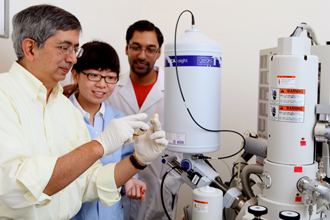Tulane leads group to design new dispersants
A consortium of research institutions led by Tulane University is slated to receive a $10.34 million grant from the Gulf of Mexico Research Initiative to help develop new dispersants that more favorably balance effectiveness and toxicity in combating deep-sea drilling accidents.

Vijay John, left, reviews oil samples with graduate students Jingjian Tang, center, and Pradeep Venkataraman. The cryo-scanning electron microscopy equipment in Stern Hall allows scientists to understand the role of dispersants in breaking up oil. (Photo by Sabree Hill)
The group also will study the role of dispersants and other chemical compounds in mitigating the environmental impact of deep-sea drilling accidents on the marine environment.
“The overriding objective of the work of this consortium is to address the question, 'What needs to be done if a Deepwater Horizon-type spill happens again?'” says Vijay T. John, Leo S. Weil Professor of Engineering in the Tulane School of Science and Engineering and principal investigator of the consortium.
The Tulane-led team was one of only eight groups awarded funding from among some 77 proposals submitted to address issues stemming from the Deepwater Horizon oil spill, the largest in U.S. history, John says.
Dispersants are used to break up oil into small droplets that can be more rapidly eaten by microbes or evaporate. Concerns have been raised, however, regarding their impact on the environment. The team will address fundamental scientific issues necessary to developing new, more effective dispersants, including mechanisms of oil breakup and droplet stabilization.
All dispersants to date have been developed for surface spills. The consortium will develop and test new, safer, dispersants for deep-sea hydrocarbon releases.
The consortium brings together scientists from throughout the nation, including 22 researchers from eight institutions from the five Gulf states and 20 participants from 14 institutions from outside the region.
At Tulane, four researchers in chemical and biomolecular engineering in addition to John will be involved with the project: Lawrence Pratt, Hank Ashbaugh, Noshir Pesika and Kyriakos Papadopoulos. The researchers possess a broad range of expertise including synthetic chemistry, thermodynamics, colloid science and transport phenomena.
